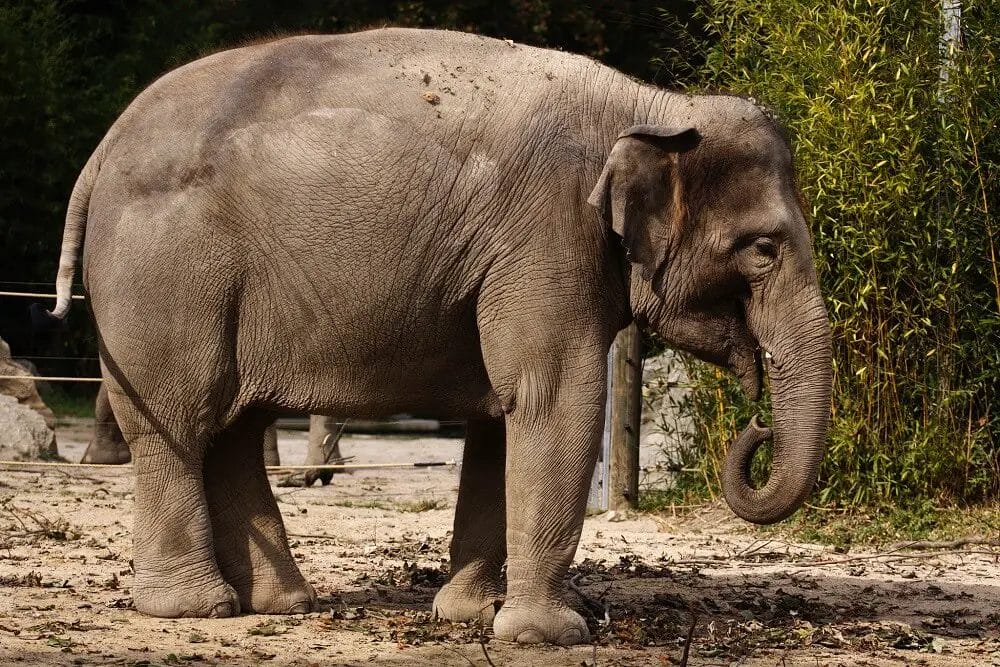Weight is a fundamental physical property that describes the force exerted on an object due to gravity. Understanding the weight of an elephant is essential for many reasons, including conservation efforts and animal welfare.
In this article, we will explore the weight of elephants, the factors that affect their weight, and how their weight impacts their lives.

How much does an elephant weigh?
Elephants are the largest land animals on Earth, and their weight reflects this fact. Adult elephants can weigh anywhere from 5,000 to 14,000 pounds (2,268 to 6,350 kg).
African elephants tend to be larger than Asian elephants, with males weighing an average of 6,000 to 14,000 pounds (2,722 to 6,350 kg) and females weighing an average of 4,000 to 6,000 pounds (1,814 to 2,722 kg). Asian elephants, on the other hand, typically weigh between 4,000 to 11,000 pounds (1,814 to 4,989 kg).
The weight of an elephant also varies based on its age. A baby elephant, called a calf, can weigh between 200 to 260 pounds (91 to 118 kg) at birth.
As they grow, their weight increases rapidly, and by the time they reach adulthood, they can weigh several times more than their birth weight.
Factors that affect an elephant’s weight
A variety of factors can affect an elephant’s weight, including diet, exercise, hormonal changes, and disease.
Diet:
An elephant’s diet plays a significant role in determining its weight. Elephants are herbivores, and they eat a wide variety of plants, including grasses, fruits, and leaves.
The amount and type of food an elephant eats can affect its weight, with a diet high in fruits leading to a higher weight than a diet high in grasses.
Exercise:
Elephants are active animals and need to move around to find food and water. Regular exercise can help maintain a healthy weight, while a lack of exercise can lead to weight gain.
Hormonal changes:
Hormonal changes, such as those that occur during pregnancy, can also affect an elephant’s weight. During pregnancy, a female elephant’s weight increases as the fetus grows, and this weight gain can be significant, sometimes reaching several hundred pounds.
Disease:
Certain diseases can also affect an elephant’s weight. For example, an elephant with a parasite infection may lose weight due to a lack of appetite.

How an elephant’s weight impacts its life
An elephant’s weight plays a significant role in determining its overall health and wellbeing. Below are some ways in which an elephant’s weight can impact its life:
Movement and mobility:
Elephants are large animals, and their weight can affect their ability to move around. A healthy weight allows for ease of movement, while an excessive weight can make it difficult for an elephant to walk, run or even stand up.
This can lead to a variety of health problems, such as joint pain and arthritis.
Reproduction:
An elephant’s weight also plays a role in its ability to reproduce. Female elephants that are overweight may have difficulty getting pregnant or carrying a pregnancy to term.
Additionally, an excessive weight can also affect the health of the calf, making it more susceptible to disease.
Longevity:
An elephant’s weight can also affect its lifespan. An elephant that is overweight or obese is more likely to develop health problems, such as heart disease and diabetes, which can shorten its lifespan.
Interaction with its environment:
An elephant’s weight can also affect its ability to interact with its environment. For example, an overweight elephant may have difficulty reaching high branches to eat leaves, or crossing through deep water.
This can limit the elephant’s access to food and water, and negatively impact its overall health.

Conclusion
In conclusion, understanding an elephant’s weight is essential for conservation efforts and animal welfare. Elephants can weigh anywhere from 5,000 to 14,000 pounds, with African elephants tending to be larger than Asian elephants.
A variety of factors can affect an elephant’s weight, including diet, exercise, hormonal changes, and disease.
An elephant’s weight plays a significant role in determining its overall health and wellbeing, including movement and mobility, reproduction, longevity, and interaction with its environment.
Further research and education on elephant weight and other related topics are essential to ensure the well-being of these magnificent animals.
How do elephants maintain their weight?
Elephants maintain their weight through a combination of diet and exercise. They are herbivores and eat a wide variety of plants, including grasses, fruits, and leaves.
The amount and type of food they eat can affect their weight. Elephants are also active animals and need to move around to find food and water. Regular exercise can help maintain a healthy weight.
Can elephants become overweight or obese?
Yes, elephants can become overweight or obese. This can happen if they have an excessive diet and lack of exercise.
Overweight or obese elephants are more likely to develop health problems, such as joint pain, arthritis, heart disease and diabetes, which can shorten their lifespan.
What is the ideal weight for an adult elephant?
The ideal weight for an adult elephant is considered to be between 5,000 to 14,000 pounds (2,268 to 6,350 kg). However, this weight can vary depending on the species, age, and geographic location of the elephant.
Can an elephant’s weight be measured accurately in the wild?
Measuring an elephant’s weight accurately in the wild can be challenging. Researchers typically use a combination of visual observations and estimates, as well as measurements of their body measurements such as girth, height and length, to estimate an elephant’s weight.
However, these estimates are not always accurate and may vary depending on the methods used.
Can an elephant’s weight affect its ability to reproduce?
Yes, an elephant’s weight can affect its ability to reproduce. Female elephants that are overweight may have difficulty getting pregnant or carrying a pregnancy to term.
Additionally, an excessive weight can also affect the health of the calf, making it more susceptible to disease.
